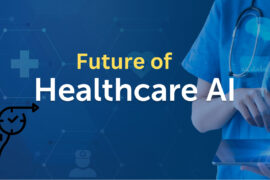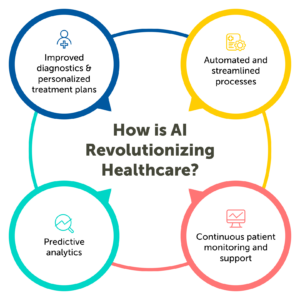Future of Healthcare AI

The healthcare industry is undergoing transformational change. From shifting regulations and economic challenges to groundbreaking technological advancements, healthcare is at a crossroads. As organizations grapple with the urgent need for innovative solutions, artificial intelligence emerges as a force driving this paradigm shift.
This blog explores how AI is reshaping healthcare, from payers and providers navigating evolving landscapes to pharmaceutical companies bracing for patent cliffs and drug price negotiations. We’ll also help you discover how these changes are not just challenges but also opportunities for the entire healthcare ecosystem, paving the way for a more efficient and effective healthcare industry.
For healthcare executives, it’s crucial to understand that AI has the potential to revolutionize healthcare delivery, enhance patient outcomes, reduce costs, and improve the experiences of both providers and patients. Guided by your strategic leadership, your organization can harness its full potential and gain a definitive advantage. Let’s begin.
AI Is Revolutionizing Healthcare

Improved Diagnostics and Personalized Treatment Plans
AI can analyze huge amounts of data to detect patterns humans miss. This enables early disease detection and more accurate diagnoses. AI also enables personalized medicine by using data to determine the best treatment plan for each patient based on their unique health conditions, lifestyle and genetics.
Automated and Streamlined Processes
Robotic process automation and AI can take over repetitive, mundane tasks such as paperwork, allowing healthcare workers to focus on patient care. AI also has applications for scheduling, billing, and other administrative tasks. These technologies reduce costs and minimize human error.
Predictive analytics
AI systems detect patterns in large datasets to predict health risks, allowing providers to take preventive action. AI is able to monitor patient data from wearables and electronic health records to identify early signs of disease and predict complications from chronic conditions like diabetes or heart disease before symptoms appear.
Continuous Patient Monitoring and Support
AI-powered wearable devices monitor patients remotely and continuously, detecting early health changes. Wearable ECG monitors are an excellent example, recording heart activity more conveniently and for a long duration. Virtual assistants provide patients with support for things like medication adherence, diet, and exercise. These tools give patients more control over their well-being and help them avoid costly emergency room visits.
By investing in AI now, healthcare stakeholders can boost their companies with a competitive advantage and improve long-term viability. The future of healthcare will include artificial intelligence, and leaders should take steps today to prepare for and benefit from this technological shift.
Click here to explore the how Fusemachines transforms healthcare businesses with its expert AI solutions. To schedule a complimentary consultation today, click here.
Reduce Costs and Improve Patient Outcomes
Investing in artificial intelligence (AI) will be crucial to reducing costs and improving patient outcomes in the coming years. As AI continues to advance, it’s projected to save the healthcare industry over $150 billion annually by 2026, according to a study by the National Library of Medicine.
For providers, AI can analyze electronic health records to identify high-risk patients, detect diseases before clinical diagnosis, recommend diagnostic tests, prepare personalized treatment plans and identify readmission risk. Clinical decision support systems are going to become an indispensable assistant to the clinicians. Chatbots and virtual assistants can handle basic patient inquiries, scheduling as well as administrative and clinical documentation. These technologies will reduce physician burnout, improve wait times and elevate patient experiences significantly.
Payers can leverage AI to streamline claims processing and minimize FWA. AI systems powered by machine learning can detect complex patterns in huge datasets that humans are at risk of missing. Personalized wellness programs tailored to individuals’ needs and risks help payers reduce costs over the long run. Automating claims processing with AI can lower administrative overhead, reducing the need for manual reviews and minimizing errors.
The future of healthcare will be built on AI, and organizations that fail to adopt will be left behind. With lives and livelihoods at stake, AI is not an opportunity healthcare can afford to miss.
Click here to explore how Fusemachines transforms healthcare businesses with its expert AI solutions. To schedule a complimentary consultation today, click here.
Optimizing Healthcare Insurance with AI
AI has the potential to optimize healthcare insurance in meaningful ways. By leveraging machine learning and natural language processing, AI systems can help insurance companies improve efficiency and personalization.
Reduction in Manual Utilization Review
While the utilization review process is crucial to healthcare insurance to ensure that medical services and treatments are appropriate and cost-effective, but manual utilization review can be time-consuming, resource-intensive, and prone to human error. AI systems can automate and streamline various aspects of this process and reduce manual utilization review.
AI automates claims processing, swiftly detecting anomalies and reducing manual assessment. It streamlines prior authorization by aligning requests with guidelines minimizing manual reviews.
Personalizing Plans
AI allows insurance companies to gain deeper insights into their members and personalize plans based on this information. By analyzing data like healthcare utilization records, demographics, and health conditions, AI systems predict future healthcare costs for members and sponsors like employers. Insurance companies can design benefits, tailor health plans and pricing for each customer, benefiting both the payers and the members.
Streamlining Customer Service
AI chatbots are advancing, they’re getting more adept at handling an expanding range of customer service scenarios. They utilize generative AI to extract insights from unstructured data and knowledge repositories, augmenting human service representatives and, considerably reducing the customer response time. Insurers can save valuable resources and time by integrating AI-powered assistants in their customer service departments.
AI-Driven Precision Population Health Management
As we move forward, artificial intelligence is set to become a crucial part of population health management. Leveraging AI in community health enhances the patient experience, fostering greater satisfaction and engagement. Simultaneously, it plays a pivotal role in cost reduction, optimizing operational efficiency within the healthcare sector.
AI excels at analyzing vast amounts of data to uncover patterns and insights. Healthcare organizations can apply AI to their population health data to better understand factors influencing outcomes, costs, and experiences. AI may detect subgroups within a population with distinct characteristics, risks, and needs to enable tailored interventions. Organizations can use these insights to redesign care pathways, develop services, and reallocate resources to serve their populations better.
AI does not stop after initial insights and plans. AI continuously monitors individuals and populations to detect changes in health status or risks, ensure care plans are properly executed, and make adjustments as needed to achieve the desired outcomes. Healthcare organizations can build feedback loops to evaluate the impact of AI-driven population health initiatives and use these findings to improve the systems and population health strategies over time.
Bottom Line
Healthcare executives are at the forefront of major changes in the industry. Artificial intelligence isn’t a trend—it’s the future of healthcare. To lead your organization in this transformation, you need to think strategically. By adopting AI innovations, you can guide your organization in this new era, ensuring it stays flexible, competitive, and capable of offering top-notch experiences to patients and members.
Click here to explore the how Fusemachines transforms healthcare businesses with its expert AI solutions. To schedule a complimentary consultation today, click here.


